Unit 2 Can I use your computer Lesson 5 课件1
五年级上册英语教案-Unit2CanIuseyourcomputerLesson51|北京课改版
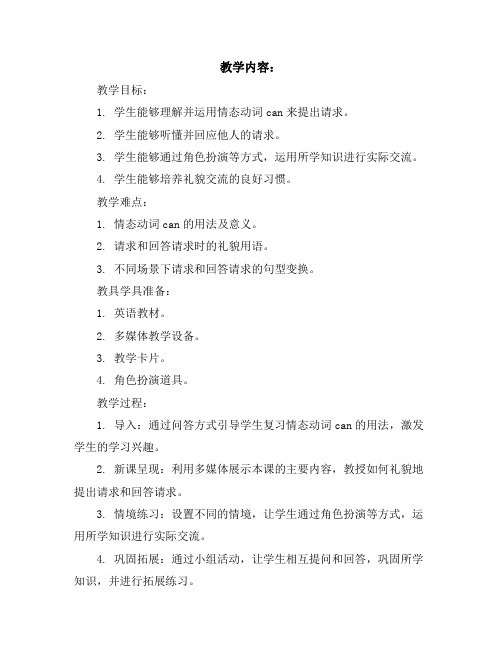
教学内容:教学目标:1. 学生能够理解并运用情态动词can来提出请求。
2. 学生能够听懂并回应他人的请求。
3. 学生能够通过角色扮演等方式,运用所学知识进行实际交流。
4. 学生能够培养礼貌交流的良好习惯。
教学难点:1. 情态动词can的用法及意义。
2. 请求和回答请求时的礼貌用语。
3. 不同场景下请求和回答请求的句型变换。
教具学具准备:1. 英语教材。
2. 多媒体教学设备。
3. 教学卡片。
4. 角色扮演道具。
教学过程:1. 导入:通过问答方式引导学生复习情态动词can的用法,激发学生的学习兴趣。
2. 新课呈现:利用多媒体展示本课的主要内容,教授如何礼貌地提出请求和回答请求。
3. 情境练习:设置不同的情境,让学生通过角色扮演等方式,运用所学知识进行实际交流。
4. 巩固拓展:通过小组活动,让学生相互提问和回答,巩固所学知识,并进行拓展练习。
板书设计:2. 教学目标:列出本节课的教学目标。
3. 教学难点:突出本节课的教学难点。
4. 教学过程:简述本节课的教学过程。
作业设计:1. 书面作业:完成课后练习题,巩固所学知识。
2. 口头作业:与家长或同学进行角色扮演练习,提高口语表达能力。
课后反思:1. 教学内容是否清晰易懂,学生是否能够掌握。
2. 教学方法是否适合学生,是否能够激发学生的学习兴趣。
3. 教学目标是否达到,学生是否能够运用所学知识进行实际交流。
重点关注的细节:教学难点一、情态动词can的用法及意义二、请求和回答请求时的礼貌用语在提出请求时,使用礼貌的语言是非常重要的。
学生需要学会使用诸如“Can I?”、“Could you?”等表达方式。
例如,在请求帮助时,学生可以说“Can I have a hand with this?”。
在回答请求时,学生也需要学会使用礼貌的语言,如“Sure, you can.”、“I'm sorry, but you can't.”等。
教师应通过角色扮演和情境模拟等方式,让学生在实际交流中练习使用这些礼貌用语。
四年级英语上册素材-Unit2 May I use your crayon课文翻译 湘鲁版
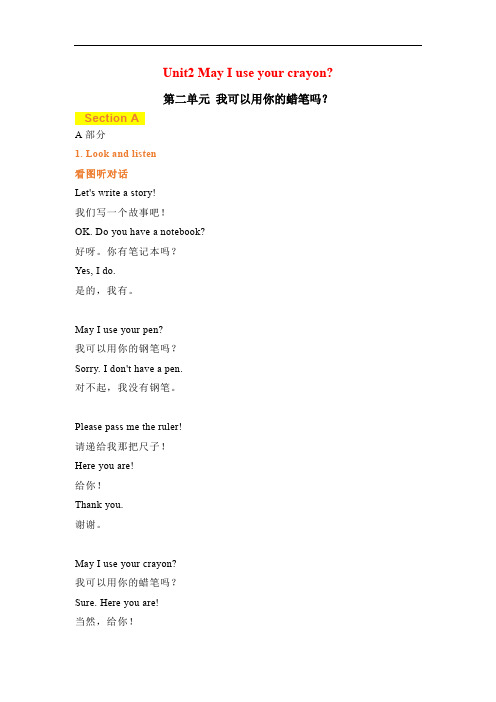
Unit2 May I use your crayon?第二单元我可以用你的蜡笔吗?Section AA部分1. Look and listen看图听对话Let's write a story!我们写一个故事吧!OK. Do you have a notebook?好呀。
你有笔记本吗?Yes, I do.是的,我有。
May I use your pen?我可以用你的钢笔吗?Sorry. I don't have a pen.对不起,我没有钢笔。
Please pass me the ruler!请递给我那把尺子!Here you are!给你!Thank you.谢谢。
May I use your crayon?我可以用你的蜡笔吗?Sure. Here you are!当然,给你!Thank you.谢谢。
2. Listen, circle and say听录音,圈出听到的词汇并跟着说lesson 课程story 故事notebook 笔记本give 给3. Look, listen and try看图听对话并练习会话May I use your glue?我可以用你的胶水吗?Sure. Here you are.当然可以。
给你。
Thank you!谢谢!May I use your eraser?我可以用你的橡皮擦吗?Sorry. I don't have an eraser.对不起,我没有橡皮擦。
4. Listen, write and tick.听录音,写一写,并选择正确的答案。
What are they going to do?他们打算做什么?What do they need?他们需要什么?Wang Li: art lesson王丽:美术课Let’s draw a cat in our art lesson.我们在美术课上画一只猫吧。
OK. May I use your crayon, please?好啊。
湘鲁教版小学四年级英语上册U2 May I use your crayon?Section A 课件

Information.
“给你”是give you还是here you are?到底有什么区别? 口语中我们经常需要表达“给某人什么”,“给”最直白的 翻译就是“give”,不过在使用的时候要注意,“give you” 不能单独成为句子使用,必须要加上某个具体的东西。
比如:I can give you some paper if you want. 如果你想要的话,我可以给你一些纸。
NO. 3 习题演练
Listen, raed and tick.
What are they going to do? What do they need?
Wang Li
( ) give a gift
( √ ) draw a cat
( ) ruler ( ) pencil
( √ ) crayon
( ) scissors
May I use your crayon?
Sure. Here you are!
Thank you!
crayon
蜡笔
Listen, circle and say.
lesson
Listen, circle and say.
story
Listen, circle and say.
notebook
Amy
( ) write an email
( √ ) write a story
( ) paper ( ) computer
( √ ) notebook ( √ ) pencil
Look and talk.
May I use your gule?
Sorry. I don’ t have any glue.
Sorry. I don’ t have an eraser.
北京版英语五年级上单词和课文学习要求

北京版小学英语五年级上册学习要求总要求:1. 基本词汇要求四会:听说读写,是必须掌握的词汇2. 补充词汇能认读,知道中文含义,有能力的学生最好背下来,增加词汇量。
3. 重点句型能认读,能书写,能替换,知中文。
4. 语音知识知道字母或字母组合在单词中的发音,并能尝试利用读音规则读、记单词。
Unit 1 Which do you like better? (Lesson 1)1. 基本词汇:食物类词汇:chicken fish sandwiches hamburgers donuts cupcake鸡肉鱼三明治汉堡包面包圈杯型蛋糕饮料类词汇:milk shake apple juice奶昔苹果汁2. 补充词汇:meat which better look at favourite a bottle of…juice go and pay肉哪一个更好的看最喜欢的一瓶…果汁去付款3. 重点句型:--- Chicken or fish, which do you like better?鸡肉或鱼,你更喜欢哪一个?--- I like fish better.我更喜欢鱼。
说明:(1)划线部分能用食物类或饮料类词汇进行替换。
(2)知道better 用于两者之间进行比较。
Unit 1 Which do you like better? (Lesson 2)1. 基本词汇:科目类词汇:English Chinese PE calligraphy science art maths英语语文体育书法科学美术数学music音乐2. 补充词汇:class best subject useful difficult interesting over there draw课,班最科目有用的困难的有趣的在那边画画3. 补充短语:do(does) best in…在…方面学得好例:I do best in maths. 我数学好。
八年级上人教版Unit2知识点大全

知识点大全SA重要动词词组help with housework 帮忙做家务, read 阅读, read English books 读英语书,exercise 锻炼, watch TV 看电视, go shopping 去购物, go to the movies 去看电影,shop 购物,use the internet 使用互联网,基本句型1What do you do on weekends? 你周末做什么?I always/usually/often/sometimes watch TV.What does he/she do on weekends?He/She always/usually/often/sometimes helps with housework.分析:试分析句子结构。
基本句型2Do you exercise?简略肯定:Yes, I do.完整肯定:Yes, I usually/often/sometimes exercise.简略否定:No, I don’t.完整否定:No, I never/hardly ever exercise.分析:试分析句子结构。
思考:如果针对he/she提问,应该怎么问与答?语法:关于频率副词频率副词:一般用来表示动作或状态发生的频率。
用法:助动词/Be动词/情态动词之后,实意动词之前。
根据动作发生的频率由大到小排列依次为:always(总是)> usually(通常)>often(经常,常常)>sometimes(有时)>hardly ever (几乎不)>never (从不)重要辨析:hardly ever与hardly1)hardly ever是频率副词,用于描述动作或状态的频率。
e.g. I am hardly ever late for school. 我上学几乎不迟到。
e.g. Jack hardly ever does his homework. 杰克几乎不做作业。
五年级英语上册unit two can i use your computer lesson 6教学设计北京版一起

UNIT TWO CAN I USE YOUR COMPUTER LESSON6 教学设计一、教学目标1. 能听懂、会用“Can you…?”请求对方允许并做出相应的回答。
2. 能指认、说出相关的动词词组use your computer, open the gift box, go out to play, watch the cartoons, watch the news。
3. 能理解对话内容并跟随录音模仿故事人物对话。
4. 能结合插图听懂内容,并做出判断。
5. 通过对话的学习,让学生知道自己的事情自己做,自己的作业独立完成。
二、教学重难点1. 教学重点:(1)初步运用请求对方允许的句型“Can you…?”给出相应答语,并给出合理解释。
(2)能够理解并朗读课文对话。
2. 教学难点:当对别人的请求有难处时,应做出合理的解释。
三、教具准备教学挂图、录音机、单词卡片。
四、教学建议(一)Listen and say分析与提示●本部分内容是询问请求允许及回答。
这样的情景与学生的实际生活息息相关。
学生们之间也经常会借用物品。
因此重点应放在如何正确地表达请求以及如何婉转地表达不同意的意见。
同时当要请求允许的事情是不对的情况下,应该严词拒绝,并能告知原因。
本部分除了引导学生正确表达请求允许的句型之外,教师要注意You should的理解及表达。
1. 导入(1)教师在黑板上利用简笔画画出一台电脑,边画边询问学生:“What's this? Is it…?”学生根据教师画的过程逐步猜测,最后得出结论:“It's a computer. ”(2)教师可与学生进行简单交流,如:“Do you have a computer a t home? Do you like playing computer games?”等。
2. 学习对话1(1)观察对话情景。
●教师出示图片中的被遮住一部分的电脑,询问学生:“What are they?”学生可能回答:“They are televisions. /They are computers. ”教师出示清晰图片,学生可能会说:“Oh, they are computers. ”●教师出示坐在电脑前两位小朋友的剪影,询问学生:“There are two boy s sitting in front of the computer. Who are they? What are they doing?”学生根据已知进行预测,可能回答:“They areYangyang and Maomao. They are playing computer games. /They are Baobao and Yangyang. They are listening to music. …”(2)初听理解对话。
《Unit 2 When do you use a computer?》教案

外研版七年级上册英语Module 7 Computers《Unit 2 When do you use a computer?》教案教材分析:本节课是外研版七年级上册Module 7 Computers《Unit 2 When do you use a computer?》的教学内容。
本单元主要围绕电脑的使用情况展开,学生将学习并运用与电脑相关的词汇,了解不同国家和地区的电脑使用情况,提高对电脑的认识和运用能力。
教学目标:知识目标:掌握重点单词:share、game、often、customer、internet、check、train、travel等。
理解并能运用重点句型:Who can...? Who doesn't have ...? What do you ...?技能目标:能够就电脑的使用情况展开谈论,运用所学词汇进行表达。
能够读懂介绍电脑用途的文章。
文化目标:了解不同国家和地区电脑使用情况,拓宽跨文化视野。
学习策略:培养学生将词汇与实际事物之间建立联系的能力。
情感态度:通过学习与电脑相关的词汇,提高学生的英语学习兴趣。
教学重点和难点:教学重点:掌握重点单词和句型,能够灵活运用。
能够用英语描述电脑的使用情况。
教学难点:学生可能对一些新的词汇和句型不熟悉。
学生可能在描述电脑使用情况时缺乏流利的表达能力。
学情分析:学生是七年级的学生,对电脑和网络使用已经有一定的了解和实际经验。
他们对于英语词汇和句型的掌握程度有所不同,部分学生可能对新的词汇和句型感到陌生。
在学习过程中,需要通过多种教学手段激发学生的学习兴趣,提高他们的参与度和表达能力。
教学过程:Step 1: Lead-inShow pictures of different people using computers and ask students: "When do you use a computer?" Encourage students to share their ownexperiences and ideas.Teacher: "Look at these pictures. Can you tell me when you use a computer? Let's take turns and share our ideas. John, when do you use a computer?"John: "I use a computer to play games and do homework."Teacher: "Great! Who else would like to share?"Step 2: Vocabulary PresentationIntroduce the new vocabulary words: share, game, often, customer, internet, check, train, travel.Teacher: "Now, let's learn some new words related to computers. The first word is 'share.' When you share something, you give a part of it to someone else. For example, if you have a piece of cake, you can share it with your friend. Can you say 'share'?"Students: "Share."Repeat the process for the other vocabulary words, providing explanations, examples, and having students repeat the words after you. Step 3: Vocabulary PracticeDivide the class into pairs or small groups.Give each group a set of word cards with the new vocabulary words. Teacher: "Now, I will give each group some word cards. Your task is to match the words with their corresponding pictures. You can discuss with your group members and work together."Monitor the groups and provide assistance as needed.After they finish, ask each group to present their matches and provide feedback.Step 4: Reading ComprehensionDistribute the reading passage about computer usage in different countries or regions.Teacher: "Now, I will give you a reading passage about computer usage in different countries. Please read it silently and underline any unfamiliar words."Allow students some time to read and underline the unfamiliar words. Teacher: "Now, I will ask you some questions to check your understanding. Who can tell me which country has the highest internet usage?"Students: "China."Teacher: "That's right! Now, who can tell me what people often use computers for in Japan?"Students: "They often use computers to play games."Discuss the answers as a class and clarify any misunderstandings.Step 5: Speaking ActivityDivide the class into pairs or small groups.Teacher: "Now, I want you to discuss and answer questions related to computer usage with your partner. Use the target language we havelearned today. For example, ask each other 'Who can play computer games?' or 'What do you often do on the internet?' Take turns and have a conversation."Monitor the discussions and provide feedback and assistance as needed. After the activity, select a few pairs or groups to share their conversations with the whole class.Step 6: Wrap-upSummarize the key points of the lesson and review the new vocabulary words and sentence patterns.Teacher: "Today, we have learned about different computer uses and practiced using the new words and sentences. Who can tell me one thing they learned today?"Students: "I learned that people use computers to check information on the internet."Teacher: "Great! Computers are indeed very useful. Now, let's have a class discussion about the importance of computers in our daily lives and the advantages and disadvantages of computer usage."板书设计:Key Vocabulary:sharegameoftencustomerinternetchecktraintravelKey Sentences:Who can...?Who doesn't have...?What do you...?教学反思:本节课通过引导学生谈论电脑的使用情况,运用重点单词和句型进行表达,达到了预期的教学目标。
必修二 unit2 语法精编版

3. No animals _w_i_ll_b_e__a_ll_o_w_e_d__ (allow) in the stadium.
4. Cheating by athletes _w_i_ll_n_o_t__b_e__ _e_x_c_u_se_d__ (not excuse). They _w__il_l _b_e_t_o_ld_ (tell) to leave and _w_i_ll_b_e__p_u_n_i_sh_e_d__ (punish).
C. will praise
D. praise
3. These films ______ until tomorrow morning.
A. can’t develop B. aren’t developing C. won’t be developed D. won’t develop 4. All those old buildings ______ down
leaving their hometowns.
(福建2010)
A. promised
B. were promised
C. have promised D. have been promised
3. His sister left home in 1998, and _____ since. (2009全国卷I)
tomorrow. A. will be knocked B. will knock C. will have knocked D. knock
Hale Waihona Puke 5 . — A party is going to ______ tonight.
Would you like to go with me?
《You can use the computers》PPT课件
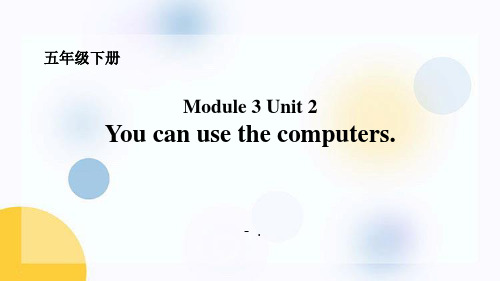
swim
Choose
He can swim. He can't swim.
ride a bike
Choose
They can ride a bike. They can't ride a bike.
把下列句子变为否定句
Lingling can't ride a horse. He can't speak Chinese. She can'tswim. My father can'tplay basketball.
What can't we do ?
library
l
shop
bookstore
park
zoo
Words: borrow Sentences: You can borrow books in the library.
You can't talk to your friends !
1.Read the dialogue and record(录音)it. 2. Try to imitate and retell the dialogue.
五年级下册
Module 3 Unit 2
You can use the computers.
-.
This is our library.
You can borrow books from here. 借入,借来
Listen and find
What can we do in the library?
把下列句子变为一般疑问句,并做回答。
Lingling can ride a horse. Can Lingling ride a horse? Yes, she can. / No, she can't.
北京版小学英语五年级上册全册教案

北京版小学英语五年级上册全册教案目录Unit1 Which do you like better ?《lesson1》 (3)Unit1 Which do you like better ?《lesson2》 (13)Unit1 Which do you like better ?《lesson3》 (18)Unit1 Which do you like better ?《lesson4》 (20)Unit2 Can I use your computer?《lesson6》 (23)Unit3 Can you tell me mid-autum festival《lesson9》 (27)Unit3 Can you tell me mid-autum festival《lesson10》 (40)Unit3 Can you tell me mid-autum festival《lesson11》 (47)Unit5 Where are you from?《lesson15》 (54)Unit5 Where are you from?《lesson16》 (63)Unit6 What are you favourite sports?《lesson19》 (69)Unit6 What are you favourite sports?《lesson20》 (79)Unit7 What will you do in chengdu?《lesson23》 (86)Unit7 What will you do in chengdu?《lesson25》 (96)Unit1 Which do you like better ?《lesson1》1教学目标1.能够听懂并朗读listen and say 中的对话内容并能运用“Whichdo you like better?I like....better.的交际用语询问并回答更喜欢哪种食物和饮料。
湘鲁版四年级英语上册知识点汇总

四(上)Unit 1 What can you see ?一、单词:classroom 教室computer 电脑blackboard 黑板see 看见can 能够bear 熊car 小汽车二、重点句子What can you see? 你能看见什么?I can see …我能看见…Is there a/an … ? 有一个…吗?Yes, there is. 是的,有。
/ No, there isn’t. 不,没有。
三、对话Andy : This is our new classroom.Wang Li : Andy .What can you see ?Andy: I can see a blackbord.Wang Li:What can you see?Andy: I can see many desks.Wang Li: Is there a computer ?Andy : Yes, there is.四(上)Unit 2 May I use your crayon?一、单词lesson 课程story 故事notebook笔记本give给may 可以use 使用sure 当然email 电子邮件picture 图片good friennds 好朋友二、重点句子May I use your … ? 我能用你的… ?Sure. Here you are. 当然。
给你。
Sorry. I don’t have a/ an / any .. 对不起,我没有…Let’s write a story. 让我们写一个故事吧。
Let’s make a card. 让我们做一张卡片吧。
三、对话A: Let’s write a story.B: Ok. Do you have a notebook?A: Yes, I do.B :May I use your pen?A: Sorry, I don’t have a pen.B: May I use your caryon ?A: Sure. Here you are.B: Thank you.四(上)Unit 3 I can run fast.一、单词play 玩,打football 足球play football 踢足球swim 游泳easy 容易fast 快的fun 有趣的can’t= can not不能二、重点句子Can you … ? 你能… ?Yes, I can. 我能/No, I can’t. 我不能。
Unit2 Can I help you?(Lesson7) (公开课)教案 (1)
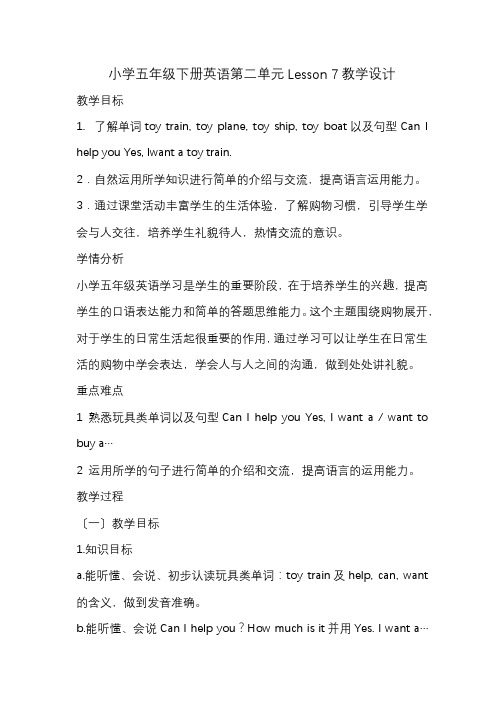
小学五年级下册英语第二单元Lesson 7教学设计教学目标1. 了解单词toy train, toy plane, toy ship, toy boat以及句型Can I help you Yes, Iwant a toy train.2.自然运用所学知识进行简单的介绍与交流,提高语言运用能力。
3.通过课堂活动丰富学生的生活体验,了解购物习惯,引导学生学会与人交往,培养学生礼貌待人,热情交流的意识。
学情分析小学五年级英语学习是学生的重要阶段,在于培养学生的兴趣,提高学生的口语表达能力和简单的答题思维能力。
这个主题围绕购物展开,对于学生的日常生活起很重要的作用,通过学习可以让学生在日常生活的购物中学会表达,学会人与人之间的沟通,做到处处讲礼貌。
重点难点1 熟悉玩具类单词以及句型Can I help you Yes, I want a / want to buy a…2 运用所学的句子进行简单的介绍和交流,提高语言的运用能力。
教学过程〔一〕教学目标1.知识目标a.能听懂、会说、初步认读玩具类单词:toy train及help, can, want 的含义,做到发音准确。
b.能听懂、会说Can I help you?How much is it并用Yes. I want a…及It’s…yuan.作出答复。
2.能力目标a.能在实际生活中运用英语表达熟悉和喜爱的玩具。
b.培养学生根据情景正确运用语言的能力。
3.情感态度目标a.在活动中培养学生的协作精神。
b.培养学生认真、积极、大胆的学习态度。
〔二〕教学重点能听懂、会说、初步认读玩具类单词:toy train及help, can, want的含义,提高学生对单词的听、说、认、读能力。
〔三〕学时难点能听懂、会说Can I help you?How much is it 并用Yes. I want a…及It’s…yuan.作出答复。
通过活动复习稳固本单元的重点句型,让学生能灵活的运用所学的句型进话。
2024三年级上册英语Unit2 Lesson2 教案

2、思维品质
3、学习能力
4、文化意识
对方介绍学习用品时做出礼貌回应,树立爱惜文具,与同伴友好沟通的意识,主动备齐文具,乐于共享文具。
教学重点
掌握核心词汇和句型;在缺少学习用品时运用“Can I use your...?”礼貌地找他人借取,并能在他人向自己借用物品时根据实情运用。
教学难点
对方介绍学习用品时做出礼貌回应,树立爱惜文具,备齐文具,同伴互助,要有学会分享的意识。
小学英语学科教案
执教人:时间:2024年9月
课题名称
人教精通版英语三年级上册Unit2 School things Lesson2
教学目标
1、在听、看、说的活动中,获取Lisa如何向他人借用学习用品及Xin xin如何回应;
2、在歌曲、图片和功能句创造的语境中,学习四个新词汇,并在会演唱歌曲的基础上创编新歌曲;
教学具准备
多媒体课件、单词卡片
教
学
过
程
Step1:Warm up
Enjoy a video about the school things.
提问:Q1:Do you like this things?
Q2:What’s the sing about?
Step2:Presentation
一、Presentation1(创设情景)
3、借助语言支架进行小组合作,向他人借用文具的情境中熟练运用以下核心句式“Can I use your ...、I can’t find my ...、Sure,here you are.”通过观察Lisa的行为,了解自己收拾书包,带齐学习用品的重要性;
4、用所学语言介绍自己的文具及借用他人的学习文具,爱惜自己的文具并有序整理收纳,要有积极向上的态度,在他人有需要时乐云提供帮助;
北京版五年级下册第二单元知识点总结

小练习: 一、选词填空 dry fix dirty walk
1.The windows are_______. Shall we clean them this afternoon? 2.The bike is broken. I can ________ it. 3.The plants are _______. Let’s water them. 4.Would you like to come to my house? Sorry. I must ______ the dog.
Can I copy your homework? 我能抄你的作业吗? No, you can’t. You should do it on your own.不,不行。你应该自 己完成。
Lesson 7 The windows are dirty. Shall we clean them this afternoon? 窗户脏了。 我们今天下午打扫好吗? Yes, let’s. 好的。 (替换: the bike/broken/fix, the plants/dry/water)
二、把序号填写在横线上
1.they 2. them 3. themselves 4. she 5. her 6.he
Lingling is going to Chengdu. ___________ is going there with__________parents. __________ are going by plane. Lingling’s uncle will pick __________ up at the airport. He will drive them to see the pandas. ____________is a good driver. They will enjoy_____________. 三、选择: 1. _____ is a girl. A.Her B.He C.She 2. That man is__________father. A.he B.she C.her 3.How old is_________ ? A.he B. him C.his 4. _________ favourite hobby is playing football. A.He B.His C.Him 5. ________ like drawing very much. A. My B. I C.Me
五年级上册英语教案-Unit2CanIuseyourcomputerLesson72|北京课改版

教学内容:教学目标:1. 知识与技能:学生能够掌握并运用本课的词汇和日常交际用语,学会询问和允许做某事的表达方式。
3. 情感态度与价值观:激发学生学习英语的兴趣,培养他们积极主动参与课堂活动的意识,增强自信心和自主学习能力。
教学难点:1. 学生能够熟练运用本课的日常交际用语,进行真实情境的交流。
2. 学生能够正确理解并运用情态动词can,掌握其用法。
教具学具准备:1. 教学课件2. 录音机3. 学生用书4. 词汇卡片5. 小组活动道具教学过程:1. 导入:通过歌曲或游戏等方式,激发学生的学习兴趣,引入本课主题。
2. 新课呈现:利用课件或实物,展示本课的词汇和日常交际用语,引导学生观察、模仿和跟读。
3. 操练:通过小组活动或角色扮演,让学生在实际情境中运用本课所学知识,提高他们的语言运用能力。
4. 巩固:通过听、说、读、写的练习,巩固学生对本课知识的掌握,提高他们的综合语言运用能力。
板书设计:2. 词汇:展示本课的重点词汇,附上图片或中文翻译。
3. 日常交际用语:列出本课的日常交际用语,附上示例句子。
4. 语法知识:简要介绍情态动词can的用法,附上例句。
5. 练习:布置与本课内容相关的练习题目,供学生在课堂上完成。
作业设计:1. 听力练习:听录音,完成相应的练习题目。
2. 口语练习:模仿本课的日常交际用语,进行角色扮演或小组讨论。
3. 阅读练习:阅读与本课内容相关的短文,回答问题。
4. 写作练习:根据本课所学知识,编写一段对话或小短文。
课后反思:1. 教师要关注学生在课堂上的表现,及时发现问题并进行针对性的指导。
2. 教师要注重培养学生的合作精神和自主学习能力,鼓励他们积极参与课堂活动。
3. 教师要关注学生的学习进度,适当调整教学节奏,确保每位学生都能跟上课程的步伐。
4. 教师要关注学生的情感态度,营造轻松愉快的学习氛围,让学生在快乐中学习英语。
重点关注的细节:教学过程一、新课呈现在新课呈现环节,教师应该充分利用教学课件或实物,生动、直观地展示本课的词汇和日常交际用语。
新北京版小学英语五年级上Unit2 Can I use your computer?备课

Unit2 Can I use your computer? ( lesson5 )一、教学目标:1、能听懂、会用询问Would you like to …?询问对方意愿;请求别人帮助并能做出相应回答Would you please…?2、能指认、说出相关的动词词组come to my house, walk the dog, at home,finish my housework。
3、能理解对话内容并跟随录音模仿故事中人物对话。
4、能结合插图听懂内容,并做出判断。
5、能够做到与人交际中使用礼貌用语。
二、教学重难点:1、教学重点:(1) 初步运用询问对方意愿及请求别人帮助的句型Would you like to …?Would you please…?并做出相应答语。
(2) 能够理解并朗读课文对话。
2、教学难点:(1) 区分Would you like to …?和Would you please…?这两个句型的意义。
三、教具准备:教学挂图、录音机、单词卡片。
四、教学建议:(一)listen and say.1、导入:(1)老师播放自编chant.Would you like to, would you like to,Would you like to, come to my house?Sure, sure, I’d like to.Would you like to, would you like to,Would you like to go with me?Sorry, sorry, I don’t want to go.(2)老师再次播放chant, 学生尝试跟唱。
2、学习对话1(1)看图预测人物话语。
●老师出示第一幅图片,请学生图片,询问学生: Who do you see in thepicture?学生回答:I see Bao bao and Mike.●老师请学生继续图片,继续询问学生:What are they doing?学生根据看到的图片回答:They are talking on the phone.●老师继续询问学生: What are they talking about? 这时学生的回答可以是多种多样的,学生可以根据自己的已有认知,尝试组织语言进行回答,如:They are talking about their plan on weekends.\ They aretalking about their homework.\ They are talking about their schoollife….(2)初听理解对话。
Unit 2 Can I use your computer L7- L8五年级英语上册(北京版)
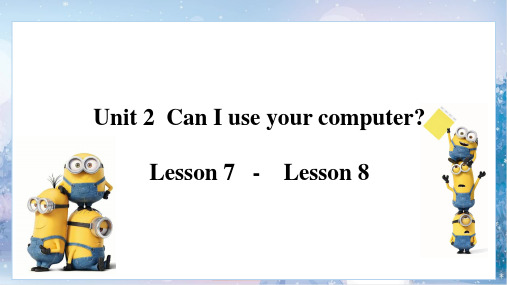
时间标志词
tomorrow/the day after tomorrow next day/week/month/year this afternoon/evening in+一段时间 soon from now on
Unit 2 Can I use your computer? Lesson 7 - Lesson 8
学习目标
1.词汇:dirty, ask, join, wash 2.语音知识:K 3.短语:clean the windows, fix the bike, water the plants 4.句型:Shall we…..?So.... 5.一般将来时; 6.理解课文内容,熟读课文。
词汇宝典
ask /a:sk/
v.1.问,询问: Can I ask some question?我能问几个问题吗? 2.邀请: Jenny is going to ask all her friends to come to the party. 珍妮打算邀请她所有的朋友来参加聚会。 【联想】question 问题 student 学生 teacher 老师
Catalogue 1. Vocabulary 2. Text 3.Grammar 4.Summary 5.Practice
Vocabulary
词汇宝典
dirty /ˈdɜːti/ adj. 脏的
(比较级 dirtier, 最高级 dirtiest) 【例句】His hand is dirty.他的手很脏。 【反义词】clean 干净的 【拓展词汇】dirty money 不义之财
